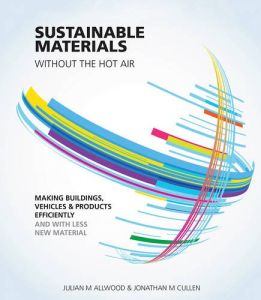Join getAbstract to access the summary!

Join getAbstract to access the summary!
Julian M. Allwood and Jonathan M. Cullen
Sustainable Materials Without the Hot Air
Making Buildings, Vehicles and Products Efficiently and with Less New Material
UIT Cambridge, 2015
What's inside?
Recycling aluminum cans won’t save the environment. Its massive problems demand large-scale solutions.
Recommendation
This unusual book on halting global climate change addresses increased “material efficiency” and the recycling, reuse and extended use of “steel, cement, plastic, paper and aluminum” in industrial production. Engineers – including Cambridge professor Julian Allwood and Cambridge lecturer Jonathan Cullen – worked with their associates to produce this clever, entertaining, wide-ranging treatise on applying common sense to manufacturing and industry to prevent environmental degradation and to attempt to slow global warming. getAbstract recommends their original, implementable solutions to those who employ, make or shape materials and to those who influence these processes, including policy makers, risk managers, standards experts, investors, materials buyers and entrepreneurs.
Summary
About the Authors
Julian Allwood, PhD, is a professor at the University of Cambridge, where Jonathan Cullen, PhD, is a lecturer. Mark Carruth, Daniel Cooper, Martin McBrien, Rachel Milford, Muiris Moynihan and Alexandra Patel are associates in the Low Carbon Materials Processing group, part of the WellMet2050 project to find ways to cut global carbon emissions from the production of steel and aluminum goods.



















Comment on this summary